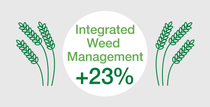Agriculture
Fighting Weed Resistance
Overreliance on a single herbicide can cause resistant weeds to develop. This puts the ability to grow a crop in a specific field in jeopardy. When resistant weeds develop, farmers face the additional costs required to control them—unplanned herbicide applications, intense manual labor, and in extreme cases, total crop loss.
Integrated Weed Management (IWM) practices help to preempt these issues and result in successful management of resistant weed populations. These include regular rotation of pesticides with different modes of action. By featuring a unique mode of action, Glufosinate-ammonium is ideal for use in rotation with broad spectrum-herbicides such as the commonly-used Glyphosate.
Glufosinate-ammonium as part of the solution
Weeds compete with crops for soil nutrients, moisture, sunlight, carbon dioxide and space. This weakens the crops and considerably reduces the quality and volume of yields. They are also hosts for insects and diseases, and decrease the efficiency of fertilizer use and irrigation systems. Weeds resistant to commonly used herbicides are becoming an increasingly serious problem in many agricultural regions of the world.
A survey conducted in the US in 2013 showed that 51 % of farmers representing 71 million acres of row crops in the US say they have Glyphosate resistance on their farms, up from 34 percent of farmers surveyed in 2011.1
To protect their produce, farmers are increasingly turning to herbicides and crop solutions with diverse modes of action, and taking proactive steps to manage weed resistance. Integrated Weed Management (IWM) programs optimize crop rotation and crop protection products. As Glufosinate-ammonium works in a different way than the herbicides that have become susceptible to weed resistance, it is ideal for rotation with them or mixtures. It is able to control herbicide-resistant weeds at the same time helping to reduce the buildup of such resistance in the first place.

Did you know?
- There are currently 437 unique cases of herbicide resistant weeds globally.2 Weeds have evolved resistance to 22 of the 25 known herbicide sites of action.3
- A recent US study showed that Integrated Weed Management improved the quality and increased winter wheat yields by 23%.4
- Herbicide resistant weeds have been reported in 83 crops in 65 countries, which threatens productivity and calls for better availability of herbicide solutions to farmers.
1Stratus Agri-Marketing 2013.
2International Survey of Herbicide Resistant Weeds, October 2014.
3International Survey of Herbicide Resistant Weeds, October 2014.
4Frank L. Young et al., Integrated Weed Management Systems Identified for Jointed Goatgrass (Aegilops cylindrica) in the Pacific Northwest, Weed Technology 24, October–December 2010, pp. 430-439.






